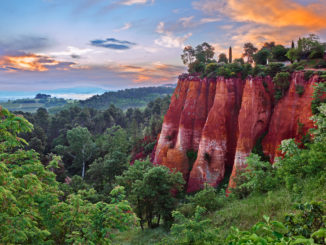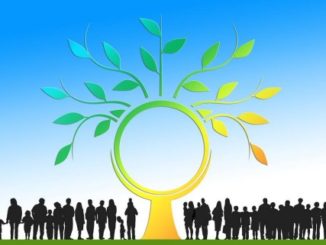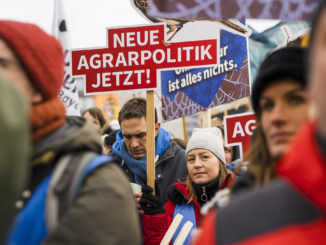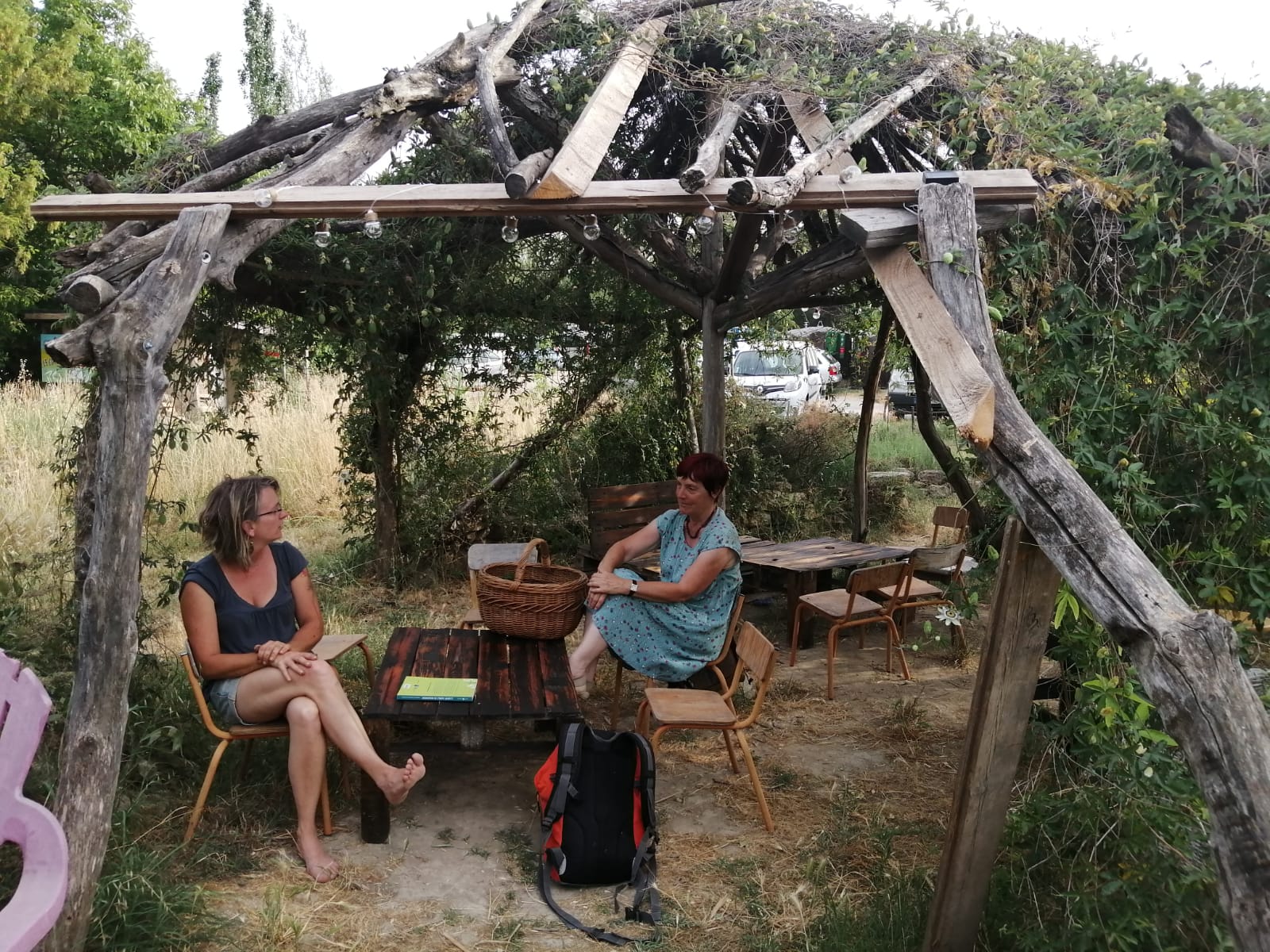
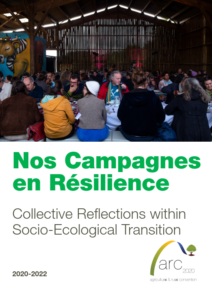
Au Maquis is a food justice non-profit based in the small Provençal village of Lauris. We were introduced to their work by our host Marie-Paule while visiting rural initiatives in the Luberon region in June 2022.
Under the shade of a cabana, we sat down with Fanny and Maud who run the farm. The association has a total of eight staff and 1,800 members, including over 100 volunteers, who come together to grow and eat, to build community and to hold space. It takes a village to cultivate food justice.
“It started with a small group of friends. We were working in community work and the humanitarian sector. We had all worked abroad on development or humanitarian projects. We came home angry and frustrated by our experiences: we were just pawns, we found ourselves distributing rice from American surpluses to Haitian farmers. The rice competed with what they could produce locally. It made no sense!
“We realised that we could be useful, here, in trying to reduce inequalities: we wanted to do political education, awareness raising around us and ourselves to do things differently. We learnt about energy, eco-building and agriculture through an eco-farming training course run by APTE.
“The first thing we did was to create shared gardens: they’re great places to build community and to ask questions about our food, our health and how it affects us all. It’s important to create welcoming spaces where people can meet. We try not to be in resistance but to go with the flow of each others’ motivations, to push in places where there’s movement happening. It’s always about the participation of people. We don’t feel that we’re preaching models: we try things out, experiment and see what works.
“For two years, we learned to grow vegetables on a small farm in Mérindol. We wanted to develop a host project to bring people in, but it wasn’t technically possible, so we had to give up. Here, there was the old mill, a beautiful building that had fallen into disuse. We approached the town hall and offered to turn the mill into a meeting place, an outdoor village café. In winter, it’s mostly local people. That brought us together. We fought to get a small room that has become the epicentre of the association. The café is open to everyone. Even if the majority of people are socially and ecologically minded, there is a real generational mix.
Creating a living food hub
“We have plans to restore the mill to create a living food hub. The idea is to have a symbolic place in partnership with the Luberon Natural Park to deal with the issue of food and bring together producers, processors, municipalities, residents and local businesses… And why not a space for food processing and for building a network locally to feed ourselves as much as possible in keeping with our values.
“That’s not to say that we’re closed off to the rest. Only we have a lot of farmland here (50 or 60% is uncultivated due to agricultural specialisation and agricultural policy). This land is irrigated thanks to the Durance canal works. We have water and incredible sunshine. This land should all be worked and made productive, or else turned into woodland. When the question of food sovereignty arises, we’ll have to start reclaiming this land and working it. That’s one of our actions!
Rural-urban ties
“We work in a priority neighbourhood [disadvantaged area that receives cohesion investment] in Cavaillon. We’ve set up a small garden in the area. We garden every Wednesday. It’s a fun way to learn about the environment through gardening.
“The neighbourhood is isolated and run-down. It doesn’t make young people want to keep their space beautiful. They’ve been forgotten. There is no public policy; we’re in a town known for its authoritarian policies.
“The most important thing for us is to build community, to get people out of their cramped flats and kitchens to plant, to snack and to enjoy themselves.
“We also go to the reception centre for asylum seekers, where there are around a hundred residents (retired migrant workers, young refugees; around 20 Ukrainians have arrived in the last few months).
“We always start with gardening and food: universal tools. We’re not all equal when it comes to the garden, because not everyone likes it or has the same sensibility. But everyone has a story to tell about cooking and the pleasure of sharing meals.
“For the last three years, we’ve been inviting people to come and garden with us (in the residence) and we share meals. There’s an incredible culinary wealth. It’s a space where, beyond the garden, a lot can be said, because it’s cosy, different to the relationships with the institution or the social worker. These informal discussions around the garden have given rise to ideas like a multilingual theatre group to explore emotions.
“Lastly, we work in a day centre for people living on the streets and in poverty. Still on the theme of food, with a small herb garden. We had to take the time to get to know this group, with in some cases mental health problems or despair. COVID put a stop to it. In the past six months, we’ve restarted cooking workshops, in small groups, on preparing ingredients, and self-care through cooking.
“From these experiences and our wish to grow food, Commune Ferme was born. We grow food with and for people living in food poverty. We collect the people from Cavaillon, and while we’re working on the farm, there’s a team that prepares a meal in the village café. Then we eat together. The meal is open to all: there’s people from the surrounding villages who come, the community food share in Cadenet, Secours Populaire in Lauris [local branch of an anti-poverty charity], local people who like the project and want to help out in the fields. The vegetables are produced and distributed together in partner locations.
Social security for food
We’ve set up a local food council. Our plate is very political. It has a huge impact on the way we grow, the way we address our health, and look at our planet. We all have the right to good quality food.
How can we, as citizens, take action on these issues? Do we have to wait for legislation to bring in social security for food?
We’ve been running this experiment for a year and a half, with a group of 20 to 25 people: farmers, retired people, working people, people from rural and urban areas, people with money and without. That’s what we wanted: diversity to enrich the debate. The first step was to find out what social security is, how it works, its history, what works and what doesn’t work. The citizens’ group tackled all these questions with the help of experts.
We want good quality organic food. On paper it’s great, but are we abandoning our conventional farmers? Are we abandoning the supermarkets? What do you give access to – products? Shops? How do you allocate the budget? What’s been defined at national level is an envelope of €150 per person per month. Can you eat healthily on €150 euros a month? They’re testing that. We’re lucky to have a region that’s very rich in fruit and vegetables. It’s not very hard for us to buy local, but do people in other regions have the same possibilities? That brings us back to the question of food sovereignty: should we only eat local? Should we help each other? Should we stop drinking coffee and eating chocolate and sugar? How do we manage a fund? How do we redistribute? How do we get involved in providing good quality food at territorial level? What is a territory? What is food democracy?
Even if social security doesn’t succeed, it feeds a lot of questioning. It’s always difficult when you’re in a theoretical discussion to argue that the experiment can be used for something else. Either you go round in circles and it doesn’t work, or the laws start to change. We’re very hopeful because there are a few politicians who are interested.”
Among the many exciting projects brewing with Au Maquis is a community canteen in the nearby town of Cavaillon, with the goal of getting more people thinking about food, and to forge new urban-rural ties.
In 2023-2024, “Nos Campagnes en Résilience” embarks on a new phase of joining the policy dots while continuing to nurture what we have built together. Now renamed the Rural Resilience project, the scope has widened from France to the broader Europe. To learn more, visit the project page, follow us on Instagram, LinkedIn and Facebook.
Visit the Rural Resilience project page
More on the project
Rural Realities | Succession – Passing It (All) On To The Next Generation
Cultivating The Future Together – ARC’s Rural Resilience Gathering in France
France | Meet The Farmer-Bakers Proving Their Skills – part 2
Cross-Pollinating Resilience From Portugal: Nos Campagnes en Resilience in Plessé



